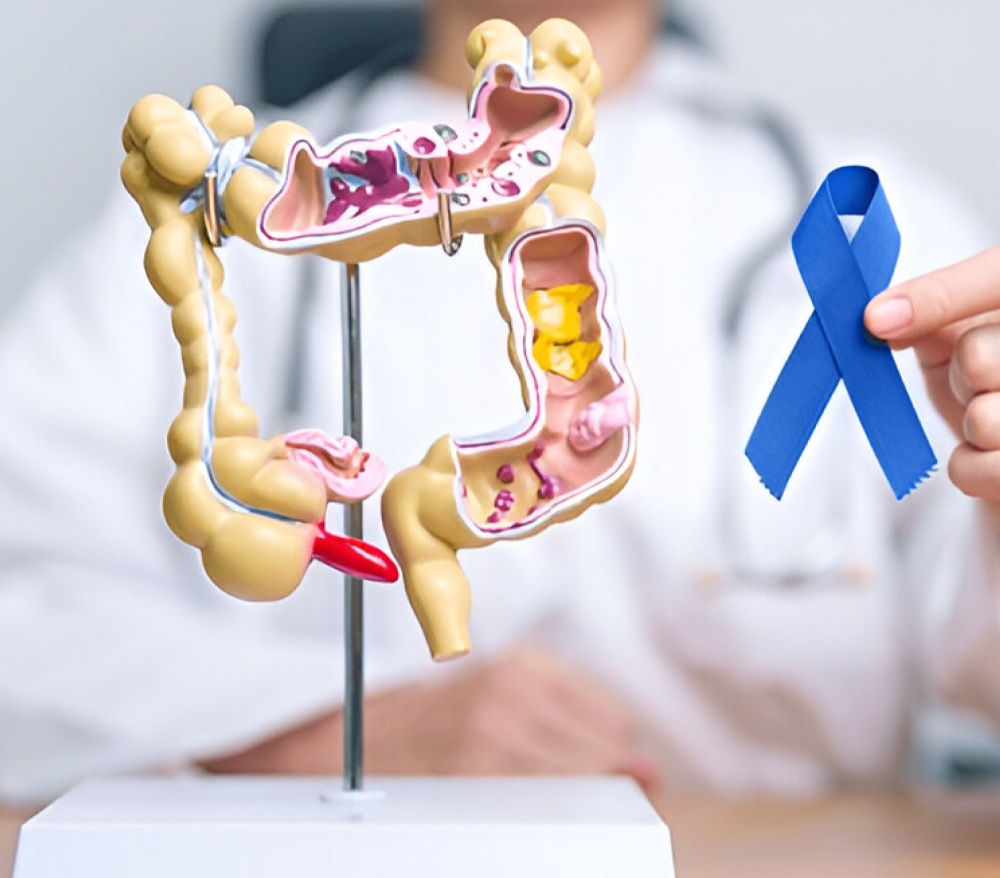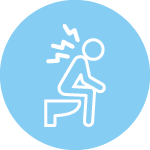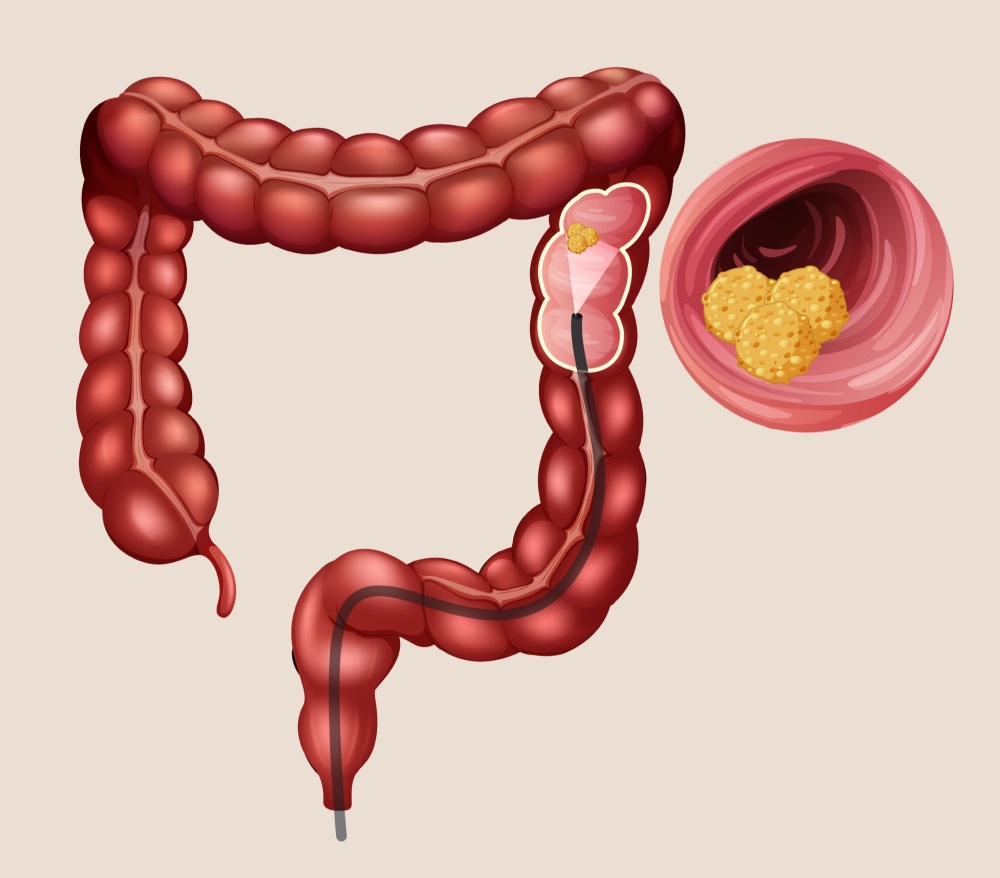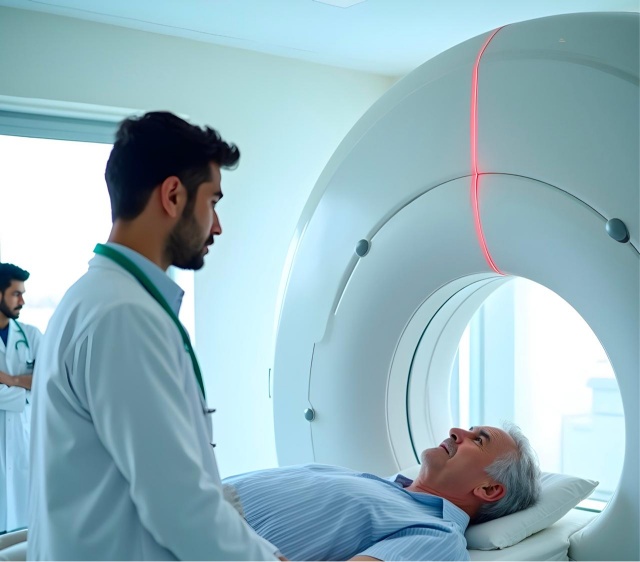Colorectal Cancer Treatments
Colorectal Cancer Treatment in India
Colorectal Cancer Treatment at Thangam
Diagnosis for Colorectal Cancer Treatment
Options in Colorectal Cancer Treatment
Colorectal cancer

Colorectal cancer care at Thangam cancer center
Colorectal cancer, also known as colon or rectal cancer, is one of the most common cancers worldwide and a leading cause of cancer-related deaths in both men and women. It originates in the large intestine, which includes the colon and rectum, both integral parts of the digestive system.
At Thangam Hospital, our experienced team of surgical oncologists, medical oncologists, gastroenterologists, and radiologists work in coordination to provide personalised, evidence-based care for patients with colorectal cancer. With a focus on early detection, organ-preserving surgery, and comprehensive follow-up care, we ensure every patient receives the best possible outcome.
What Causes Colorectal Cancer?
Colorectal cancer begins when abnormal cells form in the inner lining of the colon or rectum, often developing from pre-cancerous growths known as polyps. While not all polyps become cancerous, certain types carry a higher risk. If untreated, these cancerous cells can spread to other parts of the body.
Risk Factors for Colorectal Cancer
Several lifestyle, genetic, and medical factors increase the risk of developing colorectal cancer:
- Age over 50 years
- Personal or family history of colorectal cancer or polyps
- Chronic inflammatory bowel conditions (Crohn’s disease or ulcerative colitis)
- Inherited syndromes like Lynch syndrome or familial adenomatous polyposis (FAP)
- Low-fibre, high-fat diets
- Sedentary lifestyle
- Obesity
- Smoking and heavy alcohol use
- Type 2 diabetes
- Previous abdominal radiation therapy

Symptoms of Colorectal Cancer
Patients with colorectal cancer may not show symptoms in the early stages. As the disease progresses, typical symptoms include:

Changes in bowel habits (constipation or diarrhoea)

Blood in the stool or rectal bleeding

Abdominal bloating or pain

Persistent fatigue

Unexplained weight loss

A feeling of incomplete bowel emptying

Loss of appetite

Iron-deficiency anaemia
If you are experiencing any of the above, consult a colorectal cancer specialist at Thangam Hospital immediately.
Early intervention makes a significant difference.

Types of Colorectal Cancer
Colorectal cancer types are classified based on the kind of polyps or cells involved:
Pre-cancerous Polyps:
- Adenomatous Polyps (Adenomas): These are the most common precancerous growths. Subtypes include tubular, villous, and tubulovillous adenomas.
- Sessile Serrated Polyps: Carry a higher risk of becoming malignant, especially if large or located in the proximal colon.
- Hyperplastic/Inflammatory Polyps: Generally benign but may require monitoring if large.
Common Colorectal Cancer Types:
- Adenocarcinoma: The most frequent type, originating in mucus-producing glands lining the colon or rectum.
- Carcinoid Tumours: Arise from hormone-producing cells in the intestine.
- Gastrointestinal Stromal Tumours (GISTs): Originate in the interstitial cells of Cajal in the intestinal wall.
- Lymphomas & Sarcomas: Though rare, these may also develop in the colon or rectum and require specialized treatment.
Diagnosis at Thangam Hospital
Our comprehensive diagnostic protocol includes:
- Colonoscopy with biopsy – gold standard for detection and tissue sampling
- CT colonography (Virtual Colonoscopy)
- Tumour marker tests (CEA levels)
- Advanced imaging (MRI, PET-CT) for staging and treatment planning
- Molecular and genetic profiling to guide personalised therapy

Treatment Options for Cervical Cancer
Treatment is tailored based on the location, stage, and biology of the tumour, as well as the patient’s health condition.
- Surgical resection is performed to remove the tumour along with a small portion of surrounding healthy tissue to ensure clean margins. Nearby lymph nodes are also likely to be removed as a preventive step.
- Laparoscopic and robotic surgery involve performing surgical resections through small incisions using special viewing scopes. These minimally invasive techniques are done under anaesthesia and offer quicker recovery.
- Colostomy is a procedure where a surgical opening (stoma) is created to connect the colon to the abdominal wall, allowing waste to exit into a colostomy bag. This may be temporary or permanent depending on the case.
- Radiofrequency ablation (cryoablation) uses high-energy radiofrequency waves to freeze and destroy the tumour, often used when traditional surgery isn’t an option.
- Involves the use of medications to inhibit the growth and division of cancer cells.
- These drugs are administered either orally or through the bloodstream (intravenously) as part of systemic therapy.
- Chemotherapy is often used alone or in combination with other treatment modalities.
- Uses drugs that specifically target cancer-related genes and proteins that help cancer cells grow and survive.
- This therapy aims to block the growth signals in cancer cells while minimizing damage to healthy tissue.
- Boosts the body’s natural immune system to help it recognize and attack cancer cells more effectively.
- This treatment is generally used in specific types of colorectal cancer that have identifiable genetic markers.
- Uses targeted high-energy X-ray beams to destroy cancerous cells.
- Commonly used in rectal cancer, where the tumour often recurs in the original site.
- May be given externally or internally and is typically part of a combined treatment plan.




